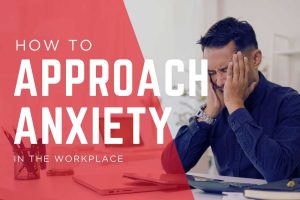What is anxiety and why is it relevant in the workplace?
Anxiety is often described as a feeling of unease, worry or fear. While a little nervousness before a big presentation or deadline is normal, for some people these feelings are constant, overwhelming and difficult to control. In a workplace context, this matters more than many organisations realise. Work is not only a source of income but also of identity and social interaction. When anxiety takes hold, it can affect all aspects of our lives.
What are the signs that someone is suffering from anxiety?
Anxiety doesn’t look the same for everyone. In some cases it manifests as physical symptoms such as rapid heartbeat, sweating or headaches. In others it shows up as behavioural changes, a usually punctual colleague may start arriving late, avoid meetings or withdraw from conversations. Even high performers can be affected, masking their symptoms until they reach burnout. The challenge for employers is that these signs can be subtle. A manager may interpret a team member’s quietness as disengagement rather than distress. By recognising patterns such as frequent sick days, difficulty making decisions, irritability or uncharacteristic mistakes, managers can start to understand when support might be needed rather than simply treating the issue as poor performance.
What can someone do if they are suffering from anxiety?
If you’re experiencing anxiety at work, you’re not alone and you’re not weak. Anxiety is one of the most common mental health conditions and help is available. The first step is acknowledgement, noticing how you feel and recognising when it’s impacting your ability to function. Many people find it useful to talk to their GP, who can assess their symptoms and discuss options such as therapy or medication. At work, it can help to speak with your line manager or HR department about adjustments that might reduce stress. This could involve flexible working hours, temporary changes in workload or a quiet space to regroup during the day. While it may feel daunting to disclose, many employers now have policies and resources to support mental health.
What can employers do to support workers who have anxiety?
Employers hold a unique position of influence. A workplace that openly values mental health can dramatically reduce stigma and make it easier for employees to seek help. This starts with leadership. Senior figures who speak about wellbeing and model healthy boundaries set the tone for others. Policies and practices matter, as well as first aid training to help managers identify those who are struggling. Adjustments don’t always require major investment. Small changes such as providing quiet spaces, flexible start times or clearer expectations around workload can make a big difference. Importantly, confidentiality should be respected and any conversations about an employee’s health handled with empathy and discretion.
What can employees do to support other workers who have anxiety?
Colleagues are often the first to notice when something seems off. A supportive workplace culture isn’t just top-down, it’s also peer-to-peer. Employees can make a difference simply by listening without judgment, offering reassurance and respecting privacy. It’s tempting to try to “fix” someone else’s anxiety, but often what they need most is understanding. Phrases like “I’m here if you want to talk” or “Take your time” can be more helpful than giving advice. Being mindful of how you communicate, like avoiding excessive pressure or last-minute demands, can also reduce triggers. Some organisations run mental health first aid training, which equips staff with skills to identify and respond to mental health crises.
In conclusion
Anxiety is not a niche issue. It’s one of the most common challenges in modern workplaces, affecting individuals at every level. Left unaddressed, it can lead to absenteeism, high turnover and lost productivity. But with awareness and action, workplaces can become places of support and recovery, rather than sources of distress. At MOHS Workplace Health, we see how proactive support benefits both people and organisations. To learn about our counselling and mental health first aid courses contact us today at info@mohs.co.uk or give us a call on 0121 601 4041.


